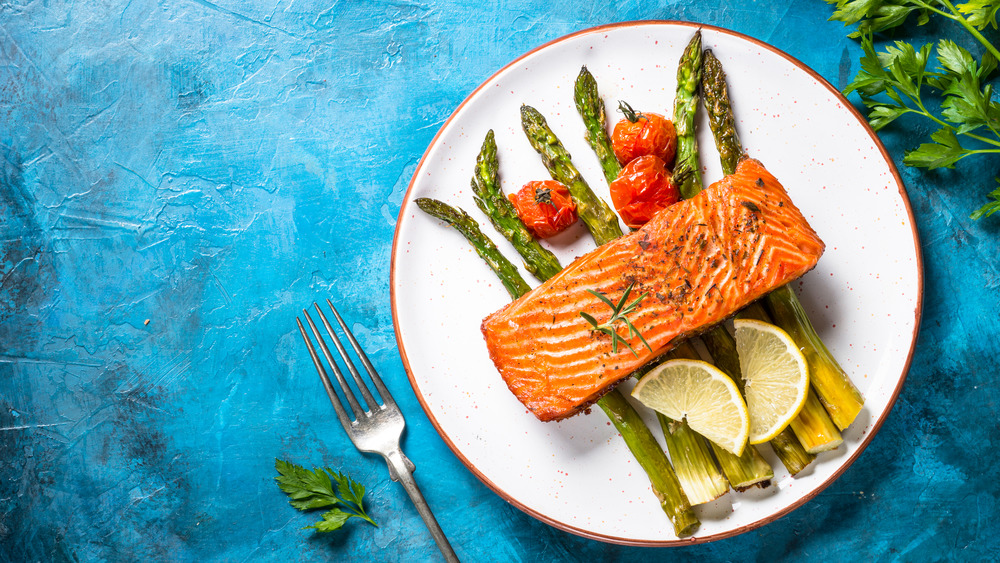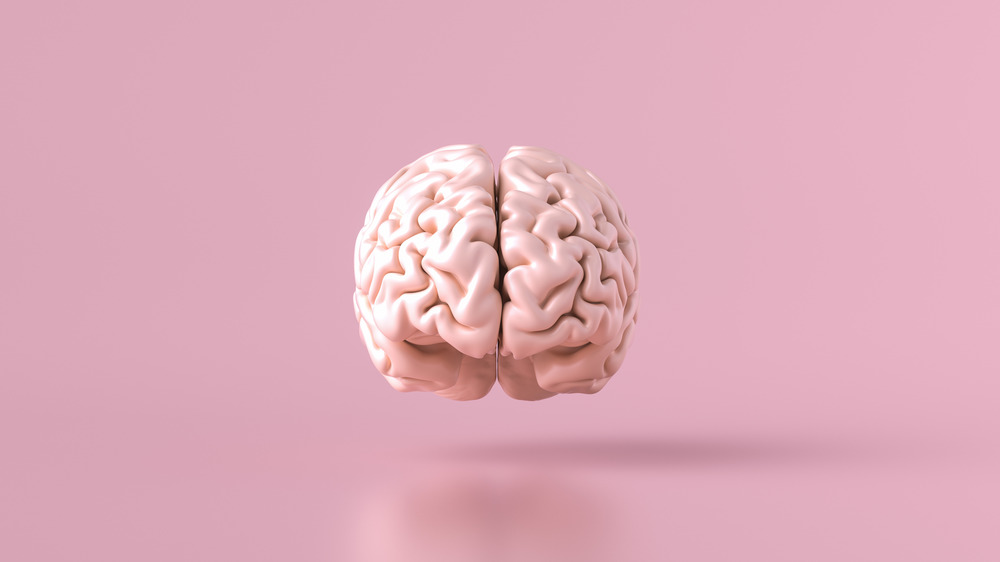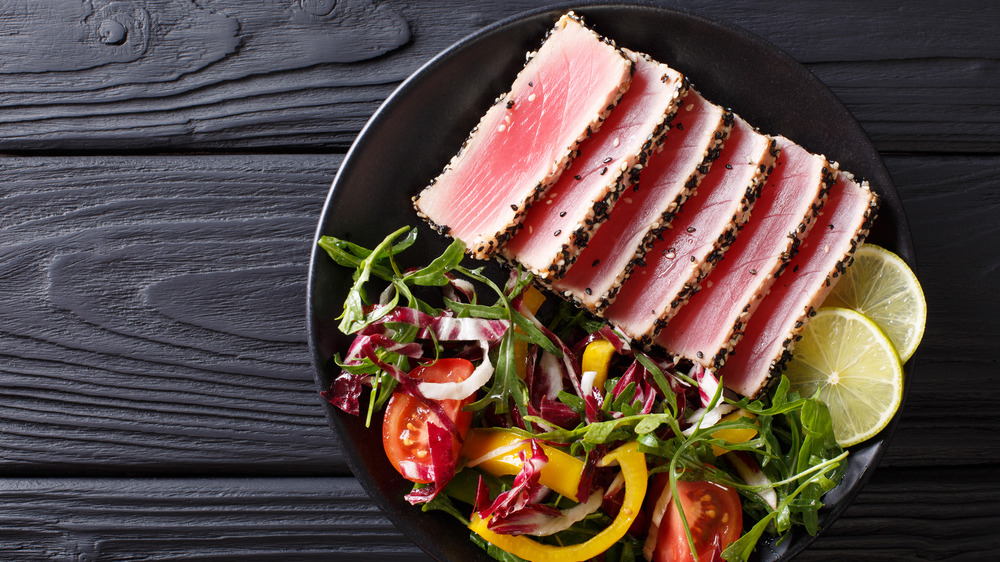When You're Pescatarian, This Is What Happens To Your Body
Pescatarianism could be the way to go if you're thinking about ways to healthify your eating habits. Pescatarianism — a vegetarian diet that incorporates fish and other seafood as protein sources — can help you to lead a balanced, healthy lifestyle, and steer away from eating too much white or red meat.
While meat can act as a valuable source of nutrition as part of a varied diet, too much of it can have some negative effects. As a study from Public Health Nutrition indicates, consuming too much red or processed meat can be harmful, with researchers finding that "higher consumption of total red meat and processed meat is associated with an increased risk of total, cardiovascular and cancer mortality."
Adopting pescatarianism, therefore, can be a lifestyle choice that can help you cut down on meat consumption while still retaining fish as a protein source — and it could do wonders for your body. In this article, we'll look at the effects that pescatarianism can have on your body, and how it could benefit your health in a whole host of ways.
You'll boost your Omega-3 intake on a pescatarian diet
The consumption of fatty acids is essential for maintaining our vitality. Aand when it comes to health, Omega-3 fatty acids are the leader of the pack. Commonly found on health food store shelves in a supplementary form, Omega-3s are rife in seafood, according to the Mayo Clinic. And as pescatarianism emphasizes prioritizing fish as a protein source, this naturally means you'll be getting more of them.
According to a study published by Nutrients, Omega-3 levels are higher across the board in seafood than in white or red meat, with easy-to-find fish like salmon, mackerel, and tuna containing ample amounts per serving. The study also pointed towards the huge amount of health benefits that consistent intake of Omega-3 provides, helping with arthritis, kidney function, combatting depression and dementia, and boosting heart health.
Although Omega-3s come in popular (and profitable) supplements, opinion is mixed on their efficacy. An analysis of 10 clinical trials from JAMA Cardiology found that Omega-3 supplements had no discernible benefits for the prevention of cardiovascular disease. It appears, then, that eating fish is the best way to reap the benefits — and by going pescatarian, you'll be getting them regularly.
When turning pescatarian, your bad cholesterol may decrease
The word "cholesterol" tends to shoot fear into the hearts of everybody — but it's important to remember that there's a good kind and a bad kind. "Good" cholesterol, or high-density lipoprotein (HDL), can help protect against strokes and heart attacks, whereas "bad" cholesterol, low-density lipoprotein (LDL), is the type that sticks to our blood vessels, increasing the risk of stroke or heart problems (via WebMD).
Eating a diet that's high in meat can raise your levels of LDL cholesterol. While we typically think of red meat as being the main culprit of this, a study from the American Journal of Clinical Nutrition found that white meat can have as much of an effect on excess LDL levels as red meat can. The study further showed that participants following plant-based diets that favored non-meat protein sources had lower LDL levels than those eating red or white meat.
Although Omega-3 fatty acids found in fish "don't affect LDL cholesterol levels," according to the Mayo Clinic, fish is a good replacement for cholesterol-raising meats. If you're concerned about your cholesterol level, adopting a plant-based diet that favors protein sources other than meat — like pescatarianism — could help to keep them in check.
Your risk of cardiovascular disease gets lower on a pescatarian diet
Leading a healthy lifestyle is one of the best ways to support your heart health. Diet is, of course, a huge factor in this — and by following a pescatarian diet, you'll be doing wonders for your ticker.
Due to the diet's combination of a lack of red and white meat, and emphasizing Omega-3-rich fish as a source of protein, you're doing double time for your heart health. As a study from the Journal of the American Heart Association shows, the risk of cardiovascular disease, mortality from cardiovascular disease, and all-cause mortality are routinely lower among those eating plant-based diets as opposed to people eating diets higher in red and white meat.
Another study, published in Circulation, found that participants who ate fish high in omega-3 fatty acids several times a week were less at risk of cardiovascular disease. Adapting your diet to reduce meat sources of protein and embrace the humble fish, therefore, could be an excellent way to support your heart's health and keep it ticking along nicely.
Choose pescatarianism and reduce your risk of type 2 diabetes
Type 2 diabetes is among the most common health conditions in the United States today; around one in ten Americans have diabetes (about 34 million people), with 90 to 95 percent of those having type 2 , according to the Centers for Disease Control and Prevention. With type 2 diabetes causing health problems that can extend to heart and kidney disease and vision loss, trying to make healthy changes to our lifestyles — and our diets — is a wise move.
Healthy eating is one of the most effective ways to both help prevent and help manage type 2 diabetes, with pescatarian and other plant-based diets offering increased protection. A 2009 study published in Diabetes Care showed that within a group of 60,000 adults, those eating vegetarian and pesco-vegetarian (pescatarian) diets had a lower prevalence and risk of type 2 diabetes. It was also found that plant-based diets may provide better protection from obesity.
Your nutrient intake may become more varied on a pescatarian diet
It seems counterproductive that by adopting a diet that removes such a prominent food source (i.e., meat) you could end up making your diet and nutrient intake more diverse. Nevertheless, by choosing the pescatarian life, you might find that you'll do just that, giving your body some much-needed dietary range. A 2013 study from Nutrition Journal shows this quite clearly: Through a period of random dietary samples on vegetarians, pescatarians, once-a-week meat consumers, and frequent meat consumers, researchers found that all groups aside from the frequent meat-eaters routinely made more favorable dietary choices (by eating more vegetables, more fiber, and other positive trends) and ate a more diverse range of foods.
Additionally, a 2016 study published in the British Journal of Nutrition analyzed many dietary patterns and found that pescatarians consume the most flavonoids of them all. If you're looking to diversify your diet or up your antioxidant intake, pescatarianism could be a good fit for you.
You might lose weight if you go pescatarian
A shift to a pescatarian lifestyle can mean that you're eating less of the unhealthy stuff and more of the healthy stuff — and in doing that, you might find that you're less susceptible to weight gain than those who routinely incorporate meat into their diets.
This is shown by a U.K.-based study published in the International Journal of Obesity, which looked at average weight gain over five years across meat-eaters, fish-eaters (pescatarians), vegetarians, and vegans. The study showed that pescatarians gained less weight per year on average than meat-eaters (with vegetarians and vegans gaining the least weight on average).
It's useful to point out that the study was conducted among a "health-conscious cohort," which suggests, perhaps, that the study group was making healthy choices anyway. As such, it's sensible to remember that just switching to pescatarianism won't automatically make you lose weight; however, it's a great way to cut out any excess saturated fats from meat that might contribute to weight gain.
On the other hand, if you're on a pescatarian diet and you need to gain weight, you'll want to focus on high-calorie, high-protein foods that still fit your pescatarian lifestyle. This could include plenty of fish and seafood, as well as things like peanut butter and legumes.
Pescatarianism could have benefits for your skin
By adopting a pescatarian diet, you might just notice a change to your skin. This is due to eating more fatty fish. The Omega-3 fatty acids that occur naturally in many fish types are essential to your skin health, helping to manage its hydration, reduce signs of aging, and protect it from sun damage (per Healthline).
Consuming more Omega-3s could also help people who experience acne. A study published in the International Journal of Dermatology demonstrated that the link between the prevalence of acne is lower among populations that consume more Omega-3s in their diets, while also showing that Omega-3 fatty acids in diets can decrease inflammatory factors that can affect the skin and its health.
Conversely, a 2014 study published in the Journal of Clinical and Aesthetic Dermatology linked higher meat consumption and increased risk of skin cancer, which reinforces that cutting down on meat and embracing a diet that looks to fish and other protein sources could be a wise move for your health. With all the benefits that pescatarianism can give to your skin, opting for a little more fish seems to be a great way to go.
You may reduce your risk of certain eye issues on a pescatarian diet
Pescatarianism is often paired alongside the Mediterranean diet — a similar diet that's seen commonly throughout Greece, Italy, and Spain. The Mediterranean diet emphasizes eating fatty fish, beans and pulses, and vegetables, and it shares many of the health benefits that pescatarianism has been shown to offer (via Verywell Fit).
One of these benefits is the increased support the two diets can offer to eye health. At least in animals, a diet rich in Omega-3s has been shown to help preserve vision and reduce chronic eyelid inflammation (via Harvard Health Letter).
Additionally, a study analyzing those who followed the Mediterranean diet closely found that their likelihood of developing age-related macular degeneration (or AMD), a leading cause of vision loss and blindness among older Americans, was reduced (via WebMD). The study found that although not one single aspect of the diet affected the likelihood of macular degeneration, it was the diet as a whole that contributed to sustaining eye health. Given the two diet's similarities and emphases on Omega-3-rich fish and healthy fats, pescatarianism could just be a fantastic choice to help maintain good vision.
When going pescatarian, your brain might get stronger
Embarking on a pescatarian lifestyle can help you eat a little cleaner, and the balance of nutrients the diet delivers comes with a huge positive: It can help with good mental health and brain function. One of the ways it can do this is through the increased intake you get of Omega-3 fatty acids through a more fish-heavy diet.
As Harvard Health Blog explained, depression is not as common in areas where people consume more Omega-3 fatty acids. Plus, a 2019 study published in Molecular Psychiatry found a reduction of depressive episodes in individuals who followed the Mediterranean diet, which is similar to pescatarianism with its emphasis on fish as a protein source, beans, legumes, and healthy fats.
Scientists noted that increased consumption of Omega-3s and sticking to the Mediterranean diet could help keep inflammation down in neurological pathways in the brain, which ordinarily could lead to increased occurrence of depression. As such, regular doses of fish may just do wonders for your mental health.
You might think you'll be lacking in iron on a pescatarian diet, but don't worry
One of the main worries people have when taking on a diet that's lower in meat (particularly red meat) — whether it's vegetarianism, veganism, or pescatarianism — is how to get enough iron. And indeed, with iron playing such an important part in our bodily systems and preventing anemia , according to WebMD, it's natural to be concerned.
Although it's common to assume that no meat equals no iron, scientists have found that's not quite the case. In a study published in The American Journal of Clinical Nutrition, researchers found that switching from a Western-style diet heavy in meat to a Mediterranean-style diet with more fish and whole grains didn't affect iron levels negatively. What's more, they found that eating more fish increase the amount of selenium in their test participants — and some of the people taking part ended up having more iron after eating less meat and more fish! This makes sense, given some fish (like tuna) are very high in iron (via Healthline).
You'll need to watch your mercury levels on a pescatarian diet
Pescatarianism can be great for your body for a host of reasons – but it's also worth thinking about some potential side effects that can come with eating the products of the sea too often. Unfortunately, higher mercury levels in your blood could be one of them.
As WebMD noted, certain types of fish, such as tuna and swordfish, can contain moderate to high levels of mercury. If consumed in excess, mercury — a heavy metal that's extremely toxic to people — can cause long-term issues like neurological damage, increased risk of heart attacks and coronary heart disease, damage to reproductive systems and if pregnant, potential damage to unborn children (via Medical News Today).
If you're concerned about mercury intake when going pescatarian, it's worth considering mixing up your protein sources or choosing fish lower in mercury like mackerel, sardines, and salmon — particularly if you're feeding young children, or if you're pregnant or breastfeeding (per WebMD). And, if you have any worries about your mercury levels, make sure to contact a health professional immediately.
You may need to pay close attention to your vitamin B12 intake on a pescatarian diet
Part of the B vitamin family, B12 is one of the most important vitamins our body can acquire regularly. However, with pescatarianism, sources of this can sometimes be lacking.
B12 is important for the correct function of our red blood cells, nervous system, and production of DNA. Since our bodies can't produce it or store it for a long time, consistent intake of this vitamin is vital (via WebMD). Unfortunately though, as B12 is most commonly delivered from animal food sources, plant-based diets can frequently result in lower B12 levels among those who adhere to them, as a study from Nutrition Reviews has shown.
Although fish is a source of B12, you may still be lacking if you your diet is mostly made up of plants (via Sutter Health). Make sure you're consuming a wide variety of foods from a range of sources, and foods such as eggs and yogurt will help to top up your B12 levels, Harvard Health Publishing suggested. It can be useful, too, to take a B12 supplement if your levels are too low.
Pescatarianism may reduce your risk of certain cancers
One of the most astonishing ways that a pescatarian diet could benefit your body is by lowering your risk of certain cancers — most noticeably, colorectal cancer. Colorectal cancer is the second most commonly occurring cancer for women and the third most commonly occurring for men worldwide, and increased consumption of processed and red meat has been seen to contribute to its risk factor (via World Cancer Research Fund). A diet rich in whole grains and dietary fiber, on the other hand, can help to reduce the risk of developing it.
Additionally, a study published in The Journal of the American Medical Association found that pescatarians had a substantially lower risk of colorectal cancer than non-vegetarians. The Omega-3s found in fish were cited as being particularly beneficial.
Although other lifestyle and genetic factors are always a consideration of cancer risk, pescatarianism's emphasis on a diet rich in beans, pulses, whole grains, and fish can help to support your health in the long run.
You'll need to keep an eye on other ingredients when going pescatarian
Although a pescatarian diet's emphasis on nutritious choices, no meat, and healthy fats might have you feeling pretty virtuous (cue choir of angels singing), it's important to remember that it doesn't automatically mean you'll be eating "pure" from here on out — and you might need to keep an eye on any meat alternatives you're incorporating into your diet.
Although plant-based meat alternatives have boomed in recent years, they're not always the most healthy. As a study published in Nutrients shows, plant-based meat alternatives can often be higher in carbohydrates and sugar than similar meat-based products such as sausages — and only 4 percent of the products found were low in sodium.
Still, many of the plant-based products studied were lower overall in calories and saturated fat — which is useful to bear in mind. But while the benefits of embracing a diet higher in fish and whole food sources are vast, you could end up eating too many processed foods if you frequently consume meat alternatives (via Cleveland Clinic). Check food labels before you buy, and aim for a well-balanced diet.















